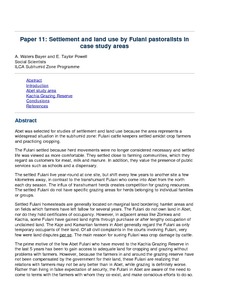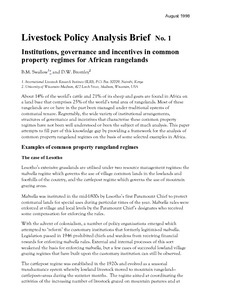Collective action and property rights for poverty reduction: Insights from Africa and Asia
Building resilience through “Open Source Seed Systems” for climate change adaptation in Kenya, Uganda, and Tanzania: What are the options for policy?
This Policy Brief is a result of a series of national and regional stakeholder consultations and a policy write shop on the establishment and maintenance of Open Source Seed Systems that ensure inclusivity of farmers and enhance freedom to develop, access, and use plant genetic materials. The brief is also based on results from research on seed networks and policy and legislative frameworks in Kenya, Uganda, and Tanzania. The stakeholders recommend the following policy options for successful establishment and implementation of Open Source Seed Systems.
Report of the FAO/OXFAM GB workshop on women's land rights in Southern and Eastern Africa
This document reports on a workshop held in South Africa in June 2003 to address continuing insecurity of women's land rights. It brought together a broad group of participants covering NGO, grassroots, government, UN agency staff, researchers, activists, lawyers, and women living with HIV/AIDS.
La Piedra: Ocupar, resistir, producir y crear
El caso que aquí presentamos, resuena como “el conflicto de Piedra Blanca”, en el contexto de la ocupación y recuperación, por parte de una comunidad organizada por familias bolivianas, de un predio disponible en la ruta nacional 36.La energía del trabajo colectivo fue enfocada en la conformación y fortalecimiento de la Cooperativa de trabajo y producción agropecuaria “Gallo Rojo”.
Autonomía de la Nación Wampís: Tarimat Pujut y la construcción del futuro común
El Gobierno Territorial Autónomo de la Nación Wampis (GTANW) ejerce su autonomía de hecho, sin expreso dictamen de la normativa interna sino basándose en el Convenio 169 de la OIT. De esta forma ejercen el control de su territorio, la cual una parte está titulada y la otra no; las áreas no tituladas son de uso y ocupación ancestral y que han sido aprovechadas y cuidadas por los Wampis.
Ubicando los derechos territoriales de los pueblos y comunidades indígenas: demandas de acceso a la tierra y territorio en la Amazonía venezolana
Presenta un panorama del acceso a la tierra y a su territorio de los pueblos indígenas de la Amazonía en Venezuela a 2017. Compara las expectativas y demandas de los pueblos indígenas con lo actualmente titulado. Asimismo, presenta la normativa vigente que permite y que limita este acceso.
Extension of security of tenure (land) Amendment Bill: stakeholders’ consultative meeting, with Deputy Minister of Labour
SALGA supports the amendments on tenure grants although it proposed that the provision of bulk services for alternative land and the delivery of municipal services should also be included in the tenure grant. SALGA supports the amendments as it affects limitations on evictions and additional rights to occupiers. The amendments on the establishment of a land rights management board and land rights management committees are also supported by SALGA. The submission discussed the challenges of evictions and the impacts of this on municipalities in detail.
Traditional strategies and adaptive resource use by crop-livestock producers in the Sahel
This presentation concerns the key property rights issues arising in the West African Semi-Arid Tropics (WASAT). The WASAT contains three main agro-climatic zones: Sahel (300–600 mm of annual rainfall falling in 2.5–4 months); Sudanian (600–900 mm, 4 to 6 month rainy season); and Guinean (900–1100 mm, 6–7 month rainy season). The author presented a conceptual framework to explain the responses that farmers in the WASAT region have adopted to deal with changes in their environment.
Settlement and land use by Fulani pastoralists in case study areas
Presents results of studies of settlement, land use & relations w. settled farmers of Fulani agropastoralists in Abet & Kachia Grazing Reserve in Subhumid Nigeria. Discusses reasons of choice of site, pattern & right of grazing and access to land.
Property rights and soil fertility management in Niger
This research was undertaken as a Ph.D. dissertation (Stanford University) in conjunction with the ILCA programme in Niamey, Niger. The objective of the research was similar to that of the World Bank studies: to test how land tenure affects land-improving investment, agricultural productivity and resource management. The standard hypothesis is that land tenure that is non-exclusive insecure or non-transferable will lead to under-investment and depressed factor mobility.
LPA Brief No. 1. Institutions, governance and incentives in common property regimes for African rangelands
About 14 % of the world's cattle and 21 % of its sheep and goats are found in Africa on a land base that comprises 25 % of the world's total area of rangelands. Most of these rangelands are or have in the past been managed under traditional systems of communal tenure. Regrettably, the wide variety of institutional arrangements, structures of governance and incentives that characterise these common property regimes have not been well understood or been the subject of much analysis.










